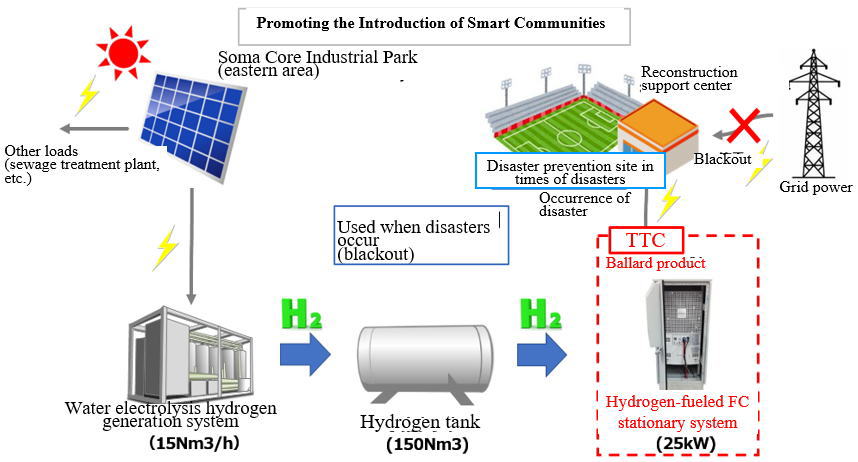Toyota Tsusho to Supply Fuel Cells for Use as Emergency Power Supply
-Contributing to a stable supply of electricity in times such as disasters-
- (former)Machinery, Energy & Project
2018-04-05
Toyota Tsusho Corporation ("Toyota Tsusho") has received orders and supplied its fuels cells for use as an emergency power supply in the Soma Revitalization Smart Community Construction Project*1 currently undergoing verification testing by IHI Corporation (Head office: Koto-ku, Tokyo; President & CEO: Tsugio Mitsuoka; "IHI") and others. Ballard's hydrogen fuel cells sold in Japan by Toyota Tsusho under a distribution agreement has been installed near evacuation centers, and contribute toward providing a stable supply of electricity in times such as disasters.
Smart communities are communities which use renewable energy, or information and communications technology (ICT) and storage batteries for supply of energy to carry out energy management for the entire community. At the same time, smart technologies are applied to systems utilized by society, such as traffic systems, medical and nursing care services, and government services. In the Soma Revitalization Smart Community Construction Project, excess electricity generated through solar power is used to created hydrogen for storage. In times of emergencies such as disasters, Ballard's direct hydrogen fuel cells are used to generate and provide a stable supply of electricity.
The merits of using fuel cells as an emergency power supply are: 1) electricity can be generated when needed, and used in the neighboring region; 2) there is extremely low electric transmission loss, and high energy efficiency; and 3) distributed energy*2 with high capability in responding to large-scale blackouts. The fuel cells to be used at Soma as an emergency power supply have an output of 25kW, the largest scale of capacity in Japan. Electricity will be supplied during emergencies to lights at evacuation centers, mobile phone chargers, and other uses.
Currently, smart community verification projects adapted to the characteristics of the local communities are being carried out. The output from renewable energy sources change according to the weather conditions, time of the day, and season, and an issue is how to achieve a stable supply. Toyota Tsusho will continue to accumulate and apply the various fuel cells in the company's lineup and knowledge on fuel cells in selling stationary fuel cells for purposes such as emergency use, and at the same time, promote the development and sale of fuel cells in new uses centered on the field of transportation.

*1 Soma Revitalization Smart Community Construction Project
An open tender was held by the New Energy Promotion Council (NEPC) in 2017, and IHI was selected to develop this project under an initiative to promote smart communities. This project seeks to build a regional energy management system using renewable energy in special areas within Fukushima Prefecture’s Soma City, such as industrial estates and municipal office, for the purposes of local production and consumption, cost reduction, and regional revitalization.
*2 Distributed energy
This is energy, such as electricity and heat, generated by comparatively small-scale power generation facilities and heat source equipment installed in the vicinity of areas where that energy is consumed.
The information in this release is current as of the date of announcement.
Please note that information may change after the date of announcement. Thank you in advance for your understanding.



